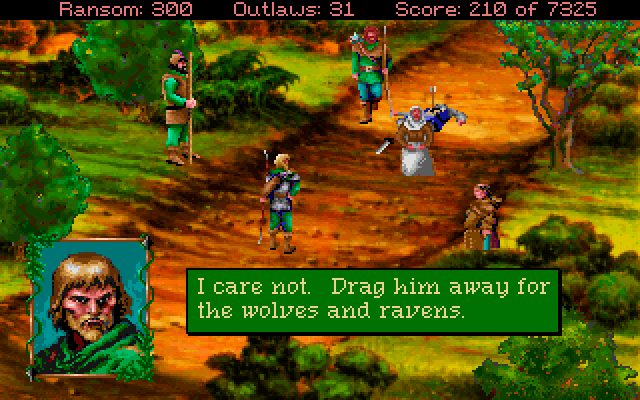@ Darth Roxor -- If it makes you feel better, I praised Gobliiins in a prior
thread, but it almost seems more of a puzzle game than an adventure game. It's certainly a genre straddler. And shame on you for getting the name wrong! That said, I concede that I'm not that knowledgeable about European adventure games. Heck, I'm not even that knowledgeable about adventure games at all compared to someone like Steven!
@ commie -- Agreed, mostly, that Sierra's puzzles were flawed. (I thought that came through a bit in my answers; perhaps not.) Even still, though, I would submit that Sierra games had a much greater diversity of puzzle design than contemporary games do. Think about all the different things in Space Quest IV, from the catching the bunny to revealing the lasers. That game is full of outrageous unfairness, but that doesn't mean it didn't also have clever puzzles.
@ monty -- I was convinced it was something the site had done, but I went back and checked and somehow I typed it that way. No idea. I don't even use the term while posting on the Codex!
@ tuluse -- A couple of things. First, I think there's a concern that power-based puzzling will be too easy (as was arguably the case in Loom). Second, I think it's just hard to come up with enough puzzles that use the powers in distinctive ways. Third, I think some people would not consider the games true adventures. Fourth, I think people tend to like inventories for their own sakes, which is why, for example, Kyrandia has both powers
and inventory puzzles.
For what it's worth, I mulled designs for two power-based adventure games over the years. One was a magic-based one, like Loom. You played as the long-lost prince of a kingdom that had been sacked by monsters; alas, you died in your infantile escape, and a necromancer Dr. Frankenstein type resurrected you. Double alas, when you hit your teenage years, the villagers decide to burn down Frankenstein's castle. Anyway, you'd have a variety of spells that you could use as you went, and a very small inventory. Maybe someday I'll come back to it. The other one was a superhero game, where you'd have at squad you controlled, so a decent diversity of powers, but one that would be static, more or less, throughout the game. In any case, it may also be that powers-based games would themselves only allow for so many types of characters (wizards, superheroes, perhaps spies).
As for Metroidvanias, I think backtracking works a little differently in them than it does in adventure games. To begin with, moving around is a lot more fun in a Metroidvania. Also, much of the backtracking is optional. Finally, the backtracking is always done in the form of "see a door, now find the key" rather than "fetch me an item." And it's usually at least roundtrip backtracking at worst, not ping-pong. Still, good point!
@ Maiandos -- Actually, the sale (handled by WEG) and the interview (about which WEG didn't know) weren't coordinated at all. Certainly part of my incentive in doing the interview is to raise the profile of Primordia and Wormwood Studios. But trying to squeeze a few $2 sales out of the Codex wouldn't really be a cost-effective use of my time, since even if 20 people from here bought the game, that would net me somethign like $7 total. That's a lot of interviewing to do for seven bucks! (Perhaps I misunderstood your post, though, and you weren't suggesting nefariousness!)
@ Karellen -- Your project sounds really neat (in fact, it's similar to an idea I was pitching for Wormwood's next project, though I was thwarted by Vic's love of inventories). I hope it makes its way out into the world sooner rather than later.
I think you're partly right about people being unable to articulate what they liked about adventure gameplay. But I guess what I'm talking about is not the positive reviews that other games got, but the negative commentary Primordia got even within the classic-adventure-game-fan community. Now, I'll be the first to admit (1) that the game is riddled with flaws and (2) that, despite my best efforts to suppress it, I have a defensive streak when people criticize it. So my reaction might be all wrong. But it seemed to me a large amount of people who grew up playing adventure games and say they loved them nevertheless said, for example, that Primordia had too many puzzles or too many inventory items or that it was grossly unjust that you could fail puzzles in Primordia (never mind that there were no deaths or dead ends) or that the puzzles required you to remember too many obscure details (never mind that the datapouch stored every necessary number or factoid and there was a built-in hint system).
If those criticisms had come exclusively from an 18-year-old reviewer at IGN, I would've been inclined to dismiss them as a result of genre ignorance or ambivalence, but we got those criticisms from all over the place: an old-timer pro-adventure-game review on GameSpy, folks on Rock Paper Shotgun, message board posts on AdventureGamers.com, etc. Now maybe there's something
else about the gameplay they really didn't like, and they were all misarticulating it, but I'm not sure. A lot of them seemed to just want more dialogue and visuals, and less puzzling.
Another random data point. Primordia was set up so that Crispin would automatically supply a context-appropriate hint if you'd been stuck for five minutes. Now, the hint system was imperfect. But mention of this feature was very, very rare in reviews or posts about the game. What was very, very common was complaints about Crispin demanding that you wait (around 60 seconds) before
soliciting another hint from him. In other words, it strongly appears that the number of people who spammed Crispin asking for hints was many orders of magnitude greater than the number of people who allowed themselves to be stuck for more than five minutes. And even with the Crispin hint system, even people who really liked the game reported using walkthroughs.
That also suggests to something to me.
For what it's worth, I have some thoughts about how to address this issue, but I want to save them for another time (put otherwise, I need to recuperate from that epic interview). The basic gist is going even farther in the multiple-solution direction we took and basically stopping thinking of puzzles as gameplay-stopping obstacles and reconceiving of them as recurrent choice-and-consequence opportunities in which certain choices are only available if you're clever or neurotic enough to figure them out. To use a metaphor, puzzles would be less like locked doors and more like hurdles. You can run a 400-meter hurdle race, knock over every hurdle, and still make it to the finish line: you just look ridiculous and are unlikely to win the race. By contrast, if you're walking down a 400-meter hallway of locked doors, either you have the necessary keys/strong shoulder/lockpick to get through the doors or you don't. If you don't, you never make it to the end of the hall. Part of what seemed to bother players about the puzzles in Primordia is that so many of them were effectively locked doors; even when they weren't literally locked doors (which they often were!), they functioned that way.
Err, well, so much for saving my thoughts for another time. That's pretty much all I've got. :/
Sorry for the slow replies -- I can't really answer during the day.





 ). I have so many thoughts going around I can't keep them straight now, but I do have one question I want to make sure I get out.
). I have so many thoughts going around I can't keep them straight now, but I do have one question I want to make sure I get out.


















![Have Many Potato [2013] Codex 2013](/forums/smiles/campaign_tags/campaign_potato2013.png)






![The Year of Incline [2014] Codex 2014](/forums/smiles/campaign_tags/campaign_incline2014.png)

 . Reading the rest tomorrow.
. Reading the rest tomorrow.





